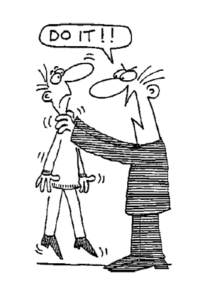 Have you ever found yourself wishing there was just one simple key that would make all your behaviour management and student discipline problems instantly vanish? I often joke with some of my colleges that the day someone develops some sort of fairy suit [the manly kind of course!] and a magic wand I will be first in line!
Have you ever found yourself wishing there was just one simple key that would make all your behaviour management and student discipline problems instantly vanish? I often joke with some of my colleges that the day someone develops some sort of fairy suit [the manly kind of course!] and a magic wand I will be first in line!
Whilst there is no one key to great classroom management results there is one word that will make a massive difference to your students behaviour, especially after they have done something wrong.
Want to know what that one word is?
I’ll tell you the one word in a minute. First let me tell you the ONE word you should avoid when confronting a student about their behaviour. The one word you should avoid is WHY. When you ask a student why it puts them in a position where they have to defend their action.
Before I heard of this behaviour management technique I would often find that a simple conversation about a student’s behaviour would escalate and before I knew it I had two issues at hand; the initial incident and now their attitude and behaviour when confronted with the problem (ever found yourself in this situation?)
Then I discovered the ONE word that more than halved my conflict and secondary behaviour management issues…
WHAT
Imagine you are one of my students and you have just directly disobeyed one of my instructions. I catch you in the act and I ask you with an appropriate amount of frustration in my voice “Why did you do ___ when I explicitly told you to ___?”
Now imagine the same scenario where I ask exactly the same question with the same frustration and tone of voice “What was going through your head when you ___ just a minute ago I explicitly told you to ___?”
Here is the difference:
When we ask our students ‘why’ they have to defend themselves because in essence we have already accused them of a wrong. A why question infers an attack that demands an answer.
When we ask our students ‘what’ we are allowing them to explain themselves which then opens a door for communication without a fight.
Now I am not saying that by asking ‘what’ you are letting the student off the hook and diminishing the gravity of their actions. What I am saying that is by asking ‘what’ it allows you then to explain the situation, how it affects you and the class and then offer a solution to the problem.
Sounds simplistic but it works. Try it out and let me know how it goes.
By the way if anyone knows of a supplier of fairy suits and magic wands I’d be keen to get their details!










